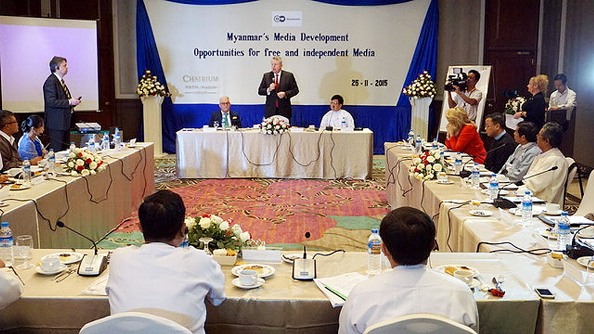Search Results for Tag: freedom of press
Building a free press from the ground up in Myanmar
With the change in government in Myanmar, a new broadcasting act is to be put in place that will allow private television broadcasting for the first time in the history of the country.
It is a critical time for Myanmar, which had been ruled by military dictatorship from 1962 to 2011, and with former military leaders continuing to maintain power in parliament since that time. After a parliamentary election on November 8, the NLD party that supports liberal democratic values won a landslide majority vote and now has the mandate to govern.
The importance of a free media in developing liberal public institutions will make itself very apparent in the near future and the level of press freedom that will actually be allowed is something to monitor. Myanmar currently ranks 144th out of 180 nations on the Reporters Without Borders Press Freedom Index. Harassment and imprisonment of journalists was widespread in Myanmar as recently as 2014.
This is why institutions like DW Akademie can make a huge difference. As Germany’s largest media development organization, it has been deeply engaged in media development in Myanmar since 2012. With the changes in the past year, DW Akademie’s activites in Myanmar have been greatly expanded. In October 2015, DW Akademie worked in cooperation with the United Nations Development Programme (UNDP) and organized a series of workshops to introduce how community broadcasting works. Myanmar also elected a press council and DW Akademie representatives attended the ceremony. Earlier in 2015, DW Akdemie organized a training program for local journalism teachers that will help support the development of local media and promote a culture of quality media at its roots.
DW has also been a consistent trusted advisor to the state broadcaster MRTV and in 2014 helped found the Myanmar Journalism Institute, the first private journalism school in Myanmar. At a recent event, organized by DW Akademie in Yangon, DW’s Director General Peter Limbourg met with media representatives to discuss the opportunities and challenges of the transition.
There has also been criticism of a 2014 News Media Law in Myanmar from the free speech watchdog Article 19, with the safeguards for media freedom being,”heavily qualified and insufficient to meet international standards.” The media situation began to look better on paper, but according to Article 19, the laws often relied on imprecise legal language that doesn’t fully guarantee freedom of expression.
Besides the trappings of governance, there is also the issue of developing a confident and effective media culture in Myanmar, so that journalists know how to do their jobs and take advantage of their potential new freedoms.
Though the transition into a free media market will be a bumpy ride for broadcasters and other media operators in Myanmar, an essential aspect of quality journalism begins from the ground up. If journalists posses skills and resources, combined with freedom to report and produce stories that have a positive effect on the social development of Myanmar, the business side of the problem could have less of an adverse impact. If the new government continues a legacy of bureaucratic and back-door control of the media, it will say a lot about where the country is heading.
New year, new BOBs
It’s that time of year again. DW is looking for your suggestions for the eighth annual Deutsche Welle International Blog Awards – better known as the BOBs. Like last year, we’re accepting your favorite sites in 11 languages: Arabic, Bengali, Chinese, English, French, German, Indonesia, Persian, Portuguese, Russian and Spanish. This year our jury of media experts, activists and bloggers will meet up in Berlin in May to debate and decide who takes home top honors in the BOBs.
This year our “Special Topic Award” puts the spotlight on culture and education. This is also the focus of the 2012 Deutsche Welle Global Media Forum in Bonn. While we will certainly continue to commend the bloggers taking a stand for freedom of expression, we’ll also be playing special attention to projects and initiatives that look at the right to education and promote intercultural dialogue.
We have already received more than 1,000 suggestions. If you know of a blog that is worthy of a BOB, you better hurry up – we are only accepting suggestions until March 13!
Timeline
Until March 13: Suggest the blogs, websites and projects that impress you.
April 2 to May 2: Look over the nominees and in each category and vote for the ones you think represent the best of the best.
May 2: Sit back and find out who won as we announce the winners.
June 26: Come to Bonn, Germany, and meet the Jury Award winners at the Deutsche Welle Global Media Forum.






Feedback